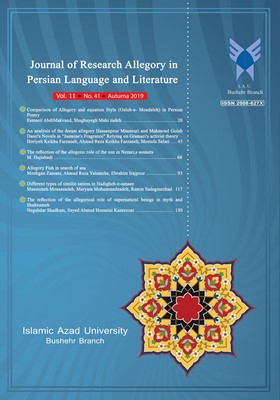Investigating the Use of Allegory in Nasserian Ethics with Adaptation to Qur'anic Themes
Subject Areas : Research Allegory in Persian Language and LiteratureMohammad hosein soleimani alamooti 1 , Ahmad Zakeri 2 * , Ali Mohammad Moazzeni Ali Mohammad Moazzeni 3 , Mehdi Mohaghegh 4
1 - Department of Persian Language and Literature, Faculty of Foreign Languages and Languages, Karaj Branch, Islamic Azad University, Karaj, Iran.
2 - Associate Professor, Department of Persian Language and Literature, Faculty of Foreign Languages, Karaj Branch, Islamic Azad University, Karaj, Iran.
3 - . Professor, Department of Persian Language and Literature, Faculty of Literature and Humanities, University of Tehran, Tehran, Iran.
4 - Professor, Department of Persian Language and Literature, Faculty of Literature and Humanities, University of Tehran, Tehran, Iran.
Keywords:
Abstract :
Mostly, languages have features that precise use of the word, mysticism and knowledge of the world by the people, precisely and in their place. One of the most prominent and influential aspects of the word is its interplay with parables, especially the proverbs and parables popular among literary works. Among the works written by poets and writers and scholars of this region are some of the varied works of Khawaja Nasiruddin Tusi, Adib, scholar and politician of the 7th century AH, some of which are written in Persian and rich in Persian. There are various parables and allegories that are often inspired by Quranic themes and derived from religious teachings. Khawaja's services to Persian language and culture and the culture of this land include such works as a valuable heritage and a valuable treasure. His works in Farsi such as the Nasserian ethics, the basis of al-Qutbbas, the attributes of al-Ashraf, the criterion of al-Ashar, etc., each of which differ in style and style, indicate that he used allegory based on the content of the book. In the literary, mystical and ethical works of Khawaja, especially the Nasserian ethic of allegory, it is a tool for consolidating moral principles and explaining Quranic teachings. This article has attempted to present the content and purpose of the word with a reference to the library method or the purpose of explaining the application of allegory to the expression of morality and social relations with emphasis on Nasserian ethics.
قرآن کریم
_||_

